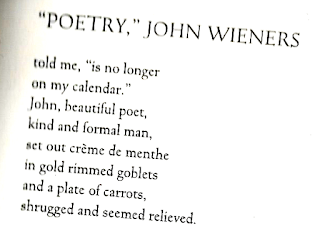October 11, 1942-August 10, 2018
"We love to be with us."
-- Bill Corbett, "Columbus Square Journal"
Begin in Blue
The blue of her robe . . . reads above all as a flat silhouetted shape—a deep infinite midnight blue, large enough to lose ourselves in . . . this very dark blue creates unparalleled effects . . . almost of hypnotic trance; it is as though we are being invited to worship not so much the Madonna as the Blue. - Timothy Hyman, Sienese Painting
"We love to be with us."
-- Bill Corbett, "Columbus Square Journal"
Begin in Blue
The blue of her robe . . . reads above all as a flat silhouetted shape—a deep infinite midnight blue, large enough to lose ourselves in . . . this very dark blue creates unparalleled effects . . . almost of hypnotic trance; it is as though we are being invited to worship not so much the Madonna as the Blue. - Timothy Hyman, Sienese Painting
I’m reading John Wieners' chapbook, Pressed Wafer, upstairs at
one of the giant tables in the Bancroft when a visiting scholar asks for help with research in
the archives where I work. And that’s how I learn that, in 1882, landscape
architects at the University of California designed a eucalyptus grove for the
Berkeley campus (a grove through which I walk once a week). Tasmanian blue gum
trees were planted as a windbreak for the cinder running track. They grew and
grew, non-natives making themselves at home. To those who’d never seen a eucalyptus
tree, the grove smelled like cough drops.
*
Wieners was a Boston boy. Later, in San Francisco he
wore blue eye shadow and sold heroin packed in matchboxes the size of a palette
of eye shadow—false eyelashes, glued one above the other on his
forehead—cockeyed Caucasian—eyelids the color and shape
of the leaves of the blue eucalyptus near the track where the beautiful
athlete, also a Joseph, also a John, breathing hard after a sprint, does not
look up at the plane from Boston passing over the track.
Boys in California know
nothing of priests in long skirts shoveling snow, winters invented by Emily
Dickinson.
*
The Blacks and the blues,
the grove as artifice
In Berkeley, Robert Creeley
recorded a version of “A Poem for Painters”:
“With want of it”—
“despair is on my face”—
“showered by the scent of the finish line”—
The golden boys protected by
tall trees
blue blood—blue
eucalyptus—blue-lined paper
“beginning with violet. I
begin in blue”
“My middle name is Joseph”
*
Sanskrit
“vaka”
“wat” (temple)
“grove” (copse, thicket)
A coppice—spinney—brake—for
the broken
A grove: a stand of trees with little or no undergrowth—So here’s the floor, all clear and still, a thicket—“cold hell”
A grove: a stand of trees with little or no undergrowth—So here’s the floor, all clear and still, a thicket—“cold hell”
Grave Love Leaves
Torn tickets in the
eucalyptus leaves, pants in the trees
Who walks through the grove
in winter rain? Pants decomposing in the decomposing leaves— pants and a dog
This was after the
picturesque era, before Free Speech— “Books in the running brooks,” books in
the trees
*
Strawberry Creek roars with
the snowmelt coming down from Truckee. The train back to Boston leaves at 3:00.
Across the “enormous”
country—passing a car filled with Beats, ascending, going where Beats don’t go.
Climbing into the mountains
he leans out the window, his ears pasted back like a dog’s—like a dog,
submissively free— submission is different when
there’s no force.
In the Rockies they close the windows now
because so many travelers have been decapitated leaning out to see the
trees—but the windows were open then, so he looked—looked—looked—
For more about Bill and his work, check out Patrick Pritchett's essay, and listen to Jackson Braider's PRX interview with Bill.
You can find books that Bill wrote and published at Small Press Distribution and at Pressed Wafer.
"Begin in Blue" was published in Ambush, a literary magazine, in 2014.
August 17, 2018: Here's Fanny Howe's portrait of Bill (and Bill's Paris Review interview with her); and here Jim Behrle and other writers remember Bill (at WBUR).
August 19, 2018: "There's no one I learned more from, not only about poetry, but also about how to live and how to be a good person,' said Fred Moten, a poet and critic who teaches at NYU." Boston Globe obituary
Here you can read Thomas Devaney's Rain Taxi interview with Bill.
And: "'Every day is poetry day': Remembering Bill Corbett," Sean Cole / pretty radio / WBUR.
August 19, 2018: "There's no one I learned more from, not only about poetry, but also about how to live and how to be a good person,' said Fred Moten, a poet and critic who teaches at NYU." Boston Globe obituary
Here you can read Thomas Devaney's Rain Taxi interview with Bill.
And: "'Every day is poetry day': Remembering Bill Corbett," Sean Cole / pretty radio / WBUR.
You can find books that Bill wrote and published at Small Press Distribution and at Pressed Wafer.
"Already fall's harsher / light cuts blown / leaf shadows into / sharp patterns. / There are fewer mornings / attending to the all / important loss column." - William Corbett, "September Song"
"Begin in Blue" was published in Ambush, a literary magazine, in 2014.



